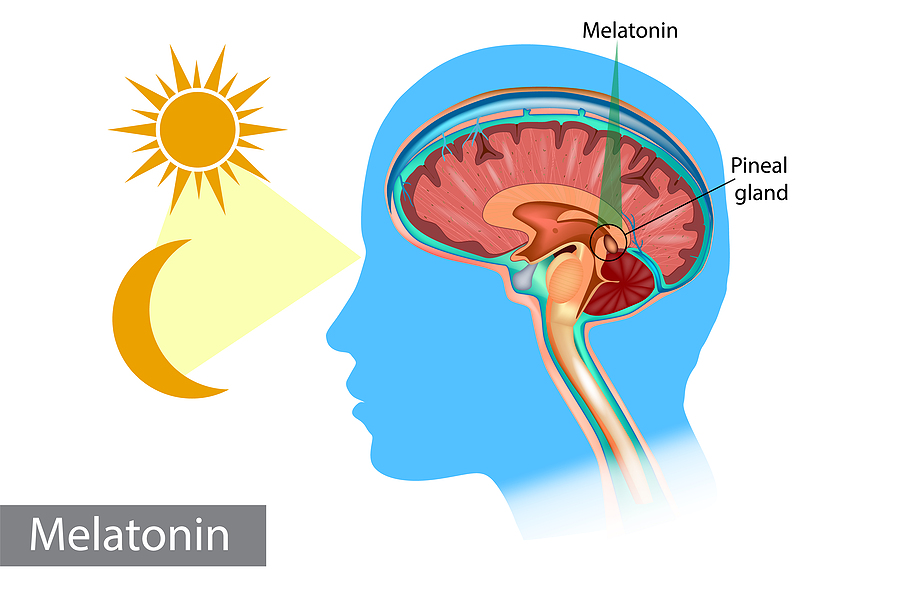
Taking an oral melatonin supplement can decrease your natural release of the hormone.
If you don’t sleep well, your entire body feels it. People who suffer from sleep disorders suffer from imbalances from endocrine hormones released from the brain. Melatonin supplements may help for some people, but we need to find two things
- Cause of melatonin imbalance
- How to wire the brain to release melatonin naturally.
Melatonin is released by the pineal gland and here we discuss bringing the body into true endocrine alinement.
If you suffer from a sleep disorder, it’s likely you’ve heard of melatonin. Widely marketed as a sleep supplement, melatonin is a hormone produced naturally in the brain that is released from the pineal gland and helps to prepare the body for sleep.
People with sleep disorders such as insomnia or sleep apnea you may have been recommended melatonin. But does melatonin have side effects?
In this article we’ll discuss if melatonin is safe to take as a supplement.
Melatonin for Sleep
Many people take melatonin for sleep, however supplements aren’t always successful. It’s important to know that the body’s circadian rhythm assists the brain and body to sleep.
For some people, melatonin is safe to take. However, there may be serious side effects, and to understand them we need to see how melatonin works for sleep. Melatonin is a powerful neurotransmitter that works in two main ways:
- It manages the circadian rhythm, or light-dark cycle, within the body.
- It prepares the body for the physical sleep process.
When the body is in complete darkness, melatonin is produced in the pineal gland, being converted by the neurotransmitter serotonin.
Darkness: Serotonin ——-> Melatonin
Light: Serotonin X Melatonin
How Melatonin Directs the Circadian Rhythm
Also known as the third eye, the pineal gland detects light from the eyes, which sends a signal via the hypothalamus (SCN) to the pineal gland. This process stops the production of melatonin when you wake in the morning and light enters the eyes. As serotonin levels rise you feel awake.
In the evening as it gets darker, serotonin begins to convert to melatonin again.
Darkness produces melatonin and can be disrupted if artificial light is present. It takes four hours for melatonin levels to peak or fall, and these cycles are governed by your circadian rhythm.
- Evening: Melatonin levels begin to rise
- Night time: Melatonin levels peak for sleep
- Morning time: Melatonin decline to prepare for waking.
Is an Oral Melatonin Supplement Safe?
Taking an oral melatonin supplement is safe for sleep. However, there are drawbacks. Remember that melatonin is a hormone, and, in the long term, taking a melatonin supplement decreases the pineal gland’s natural production of melatonin.
Studies show that melatonin supplements do increase the levels of melatonin found on the blood. A melatonin supplement for sleep may work in the short term and will likely have few side effects, and some studies do report people experiencing benefits from melatonin supplements.
If you suffer from a chronic sleep disorders, it can take some time to achieve healthy melatonin levels. In these cases, an oral melatonin supplement for sleep may be beneficial. However, in my patients who take melatonin, I always advise them to have a plan to taper and decrease melatonin to avoid side effects.
For safe use of melatonin for sleep, aim to:
- Aim to boost natural melatonin. (We will discuss this in the next section.)
- Use a melatonin supplement for a short period if needed, as directed by your medical professional.
- Taper your dosage down.
Conclusion
Research shows melatonin is safe to take as a sleep supplement, however, be aware of its side effects, which are a potential decrease in natural melatonin levels over longer periods of taking the supplement. In the next part of this series we’re going to explore the pineal gland as the master endocrine gland.
Warning: before taking any supplement or medication you should always consult your registered physician first.
Now we want to hear from you. Please leave your questions in the comments below.
For more information on Dr. Lin’s clinical protocol that highlights the steps parents can take to prevent dental problems in their children: Click here.







